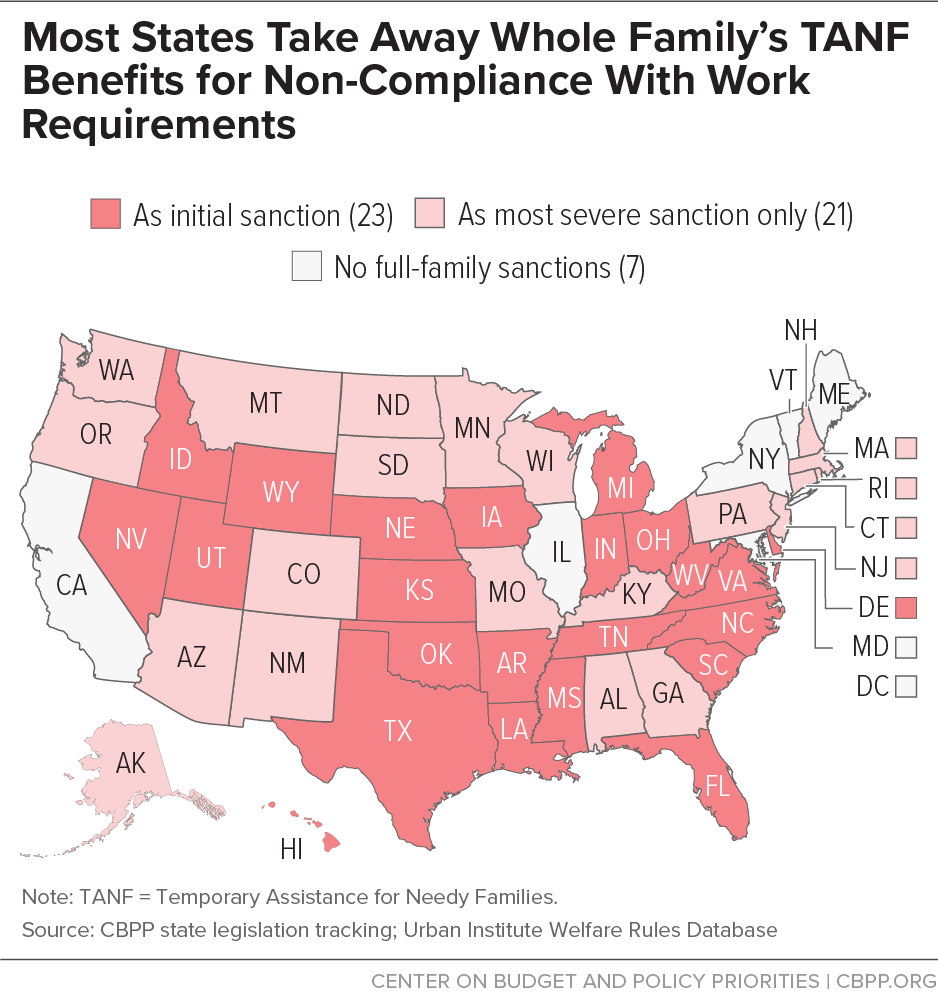BEYOND THE NUMBERS
June 17, 2021: We have updated this post.
Maine policymakers have joined several other states in repealing full-family sanctions in the state’s Temporary Assistance for Needy Families (TANF) program. Full-family sanctions take away assistance to the entire family if the parent doesn’t meet TANF’s work or other requirements. In repealing the full-family sanction policy, Maine is ending a racist policy and strengthening cash assistance for the state’s children living in poverty.
Under federal law states are required to meet a “work participation rate” or face a penalty. Although federal law does not require recipients to work or be engaged in work-related activities until they have received assistance for two years, most states do require immediate participation and take away benefits for either the adult or the whole family if the individual does not meet the requirements without good cause. States have taken away the full benefit amount for more than 2 million families since TANF was implemented in 1997 because of work-oriented sanctions, and many more have had their support reduced.
States set their own sanction policies, and all but three — California, New York, and Vermont — have adopted full-family sanctions at some point since TANF was created in 1996. Nearly half of states impose full-family sanctions as the initial punishment for non-compliance with work requirements, and states with higher concentrations of Black residents have a higher likelihood of doing so. The length of full-family sanctions varies by state and ranges from one month or less for initial sanctions to permanent case closure for the most severe sanctions.
Illinois and Washington, D.C., previously adopted full-family sanctions and have since repealed those policies; Maryland is in the process of repealing them, with all counties scheduled to implement repeal by July 1. (See map.)
Maine was one of the last states to impose full-family sanctions. It implemented the policy in 2012, among the harmful TANF policies the state adopted under former Governor Paul LePage, including the establishment of a 60-month TANF time limit that left hundreds of families without work or cash assistance.
LePage and others relied on associating TANF recipients with stereotypes of criminality and irresponsibility — going so far as to insinuate that TANF benefits were being used to bail people out of jail — to rationalize restrictive TANF policies. This rhetoric is part of a long history of politicians using anti-Black narratives to promote restrictive policies like work requirements, which are now TANF’s defining feature. But these racist policies do not just harm Black families. In Maine’s case, the vast majority of children experiencing poverty who could be served by a stronger TANF program are white.
Almost all studies comparing the race/ethnicity of sanctioned and non-sanctioned TANF recipients find that Black, Indigenous, and Latinx families are significantly more likely to be sanctioned than their white counterparts. TANF case managers’ implicit bias likely contributes to these disparities. In an experimental setting, case managers given fictional clients who were otherwise identical except for their race were more likely to sanction fictional Black clients than fictional white clients.
Studies have also found that state and local TANF administrators often erroneously impose sanctions, and sanctioned recipients are more likely to face significant barriers to employment, such as lower levels of education, disabilities, or lack of transportation. Families whose benefits are taken away for failing to meet a requirement also have poorer employment outcomes and are less likely to escape deep poverty than other families that leave TANF.
Today, harsh policies limit access to cash assistance for families of all races. In 2019, TANF reached just 23 of every 100 families experiencing poverty, down from 68 of every 100 families in 1996. Work requirements, sanctions, and policies that make applying for aid difficult have largely fueled this dramatic decline in access to TANF cash assistance.
Experiencing poverty and hardship, even briefly, has detrimental, life-long impacts on children. Conversely, even relatively small infusions of cash, like those from TANF, can make a positive difference. To promote racial equity and child well-being, other states should join Maine and end full-family sanctions.

